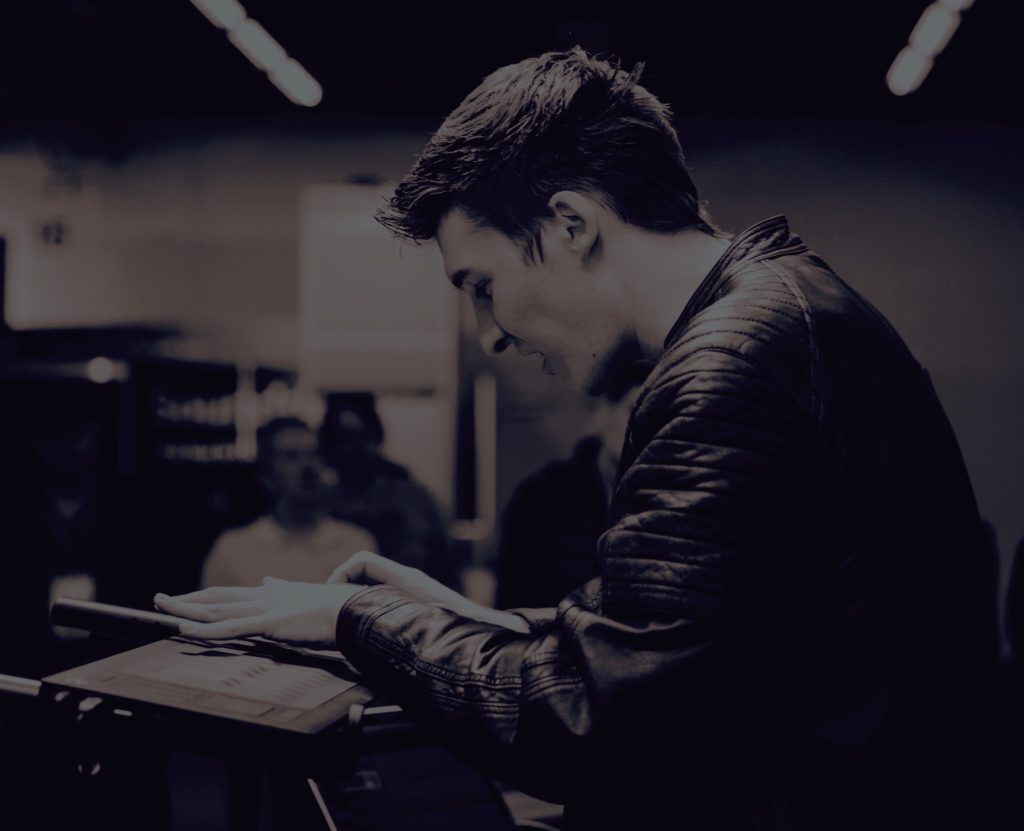When Asher media sent us the promo for Austrian keyboard wizard Gerald Peter’s newest video, Enigma, we knew we had to interview him. This resulted in a massive amount of questions, so we decided to split the interview into two parts. This is part one.
Peter studied piano privately from a young age, however he opted not to attend a formal music conservatory. He arrived on the prog rock scene back in 2013 with the concept album ‘Jeremias – Foreshadow of Forgotten Realms’ by his 8-piece band Circle of Illusion. In this album, he played keyboards and composed and produced all of the music.
Gerald holds a Masters Degree in Multimedia and Software Development from which stems his passion for technology and computer graphics. Some technology which he developed was used by virtuoso Jordan Rudess on stage during his Dream Theater concerts.
In his latest music project video project and EP ‘Incremental Changes – Part One‘ he also incorporated his own MIDI reactive visuals, which he programmed visualising real-time MIDI data both from keyboard and seaboard.

Gerald Peter Interview part 1
Slickster: Is there anything you’d like to mention or talk about before I ask some questions? Is there anything you’d like to clear up or any mis-information about you online?
Peter: No, but thanks for having me on to interview! I’m always interested to talk about music, especially my music, because I spend so much time on it! That is some my main motivation for working on my own music, because I get bored easily when I work on someone else’s music. I love to realize my own ideas. I usually go to the piano, start improvising and something comes out. It goes from one idea to the next, and in the process, I’m building my music.
Slickster: So, building your own music is your main motivation for playing and being involved in music?
Peter: I’ve always loved improvising on the piano. Even after my first few piano lessons, I started to sit down and press random keys on the piano. I’m fascinated when some cool chord progression comes up. Over the years I’ve worked on this skill, taking a few chord progressions or a melody in my head, and I put it in my hands.
When you can transfer musical ideas from your head into your hands and translate that to an instrument without interruption, it is a beautiful skill. I developed this skill only after years of playing and improvising.

Slickster: You opted for private lessons from various classical and jazz pianists since the age of ten. Why did you choose not to attend conservatory? Is music school over-priced and/or over rated?
Peter: That’s a great question! I think when I was about ten years old, I didn’t have a career in my mind. It was a hobby for me. I started piano because I saw some people playing it, and I was inspired by them. My parents agreed to get me some lessons, but they me commit to at least 3 years of lessons. It ended up stretching into six years of lessons.
When I was young, I wasn’t into practicing that much. I’d maybe do like ten minutes per day, just to get prepared for my next lesson.
Slickster: Can you describe some of the ways that Incremental Changes – Part 2, will be different from Part 1.
Peter: It will be longer, nearly double the running time as the first album. There will be over fifty minutes of music on this album. The production has improved a lot on this album too. I’ve spent a lot of time getting many different layers and different sounds.
On this album, I’ve also experimented more with combing different genre’s together. So you will hear a lot more influences from electronic music but also influences from jazz, prog rock and cinematic styles.
GP on cinematic music
Slickster: Have you scored a movie, or created any music for video, movies, or video games?
Peter: Only for fun, but never professionally, of course I’m open to this in the future. I love film music, it’s really something that gives me goosebumps. Hans Zimmer or Danny Elfman have such great soundtracks. There are times when I sit down and just listen to a soundtrack album. I also transcribe these soundtracks for learning purposes.
On my Youtube channel I have my own interpretation of Elfman’s theme from Spiderman. I worked very long on this keyboard interpretation. It was a fun challenge, but not easy to play!
Slickster: You mentioned Hans Zimmer. Some people kind of throw him under the bus because he’s done a lot of commercial films like Pirates of The Caribbean, but if you listen to some of his other soundtracks – like Dunkirk, Interstellar and Inception – they are radically original and advanced. Could you share some thoughts on Zimmer and his avant grade film scores?
Peter: I loved the Inception soundtrack. That’s a perfect example of how ‘simple music’ can be awesome! (laughs) It’s not very complicated – the main theme is like, five chords – but from a sound design and an arrangement perspective, it’s so well done. It builds from small piano chords to added string texture and then some horns, and it just keeps building more, more and more! Then when you think it can’t build any more it builds even more. It’s incredible. When I listen to this it transfers me into another universe.
Slickster: The new single on your album is Enigma, an eight minute prog rock opus. What can you tell us about it? How did you compose it? Did you use any compositional techniques?
Peter: It started with an idea I had ten years ago. I sang the main riff into my voice recorder. [Sings the left hand piano part] It was inspired by a Dream Theater song.
Slickster: Which Dream Theater song? Do you remember?
Peter: Yes it was from Home (Act 2, Scene 8) from Metropolis Pt. 2: Scenes from a Memory.
Ten years later, I still hadn’t used it, so I picked it up again and started working with it. I knew I wanted to do something huge with it… a big sound, pads, and a really catchy melody as well. I placed a melody that I also used several times on Incremental Changes Part 1 (sings melody), and I think its kind of the main theme of Incremental Changes. I use this theme in many variations.
I didn’t use any specific composition technique, but what I do is record something on my audio work station, and then I listen back to it many times. I might listen to it on my ear buds while I go shopping or walking around. Then I think, “Ok. What do I want to hear next? What would be cool for the next part?”
As I listened to the ideas for Enigma, I realized I needed a new riff and a new time signature. So, I collected ideas in my head and sang them into my phone. Then I go back to my instrument and try work those ideas out with a unique sound. Eventually, I put everything together in the end, and HOPEFULLY (laughs) putting the main theme back at the end.
At the same time, I try to keep the mood and the energy of the song building. I want the listener to feel as though they have been on a journey around the theme.
Does that make sense?! (laughs)
Slickster: Absolutely!
Peter: It’s hard for me to talk about music, because I don’t really think about it this way when I’m creating it. For me, it’s like a feedback loop where I record something and then listen back. Record something, then listen back. Sometimes I throw away ideas or even whole songs because I don’t like it anymore. So, it’s all about this feedback loop and in the end it’s all about, “Do I hear what I want to hear.”
Bandcamp: http://geraldpeter.bandcamp.com
Facebook: http://www.facebook.com/geraldpetermusic

